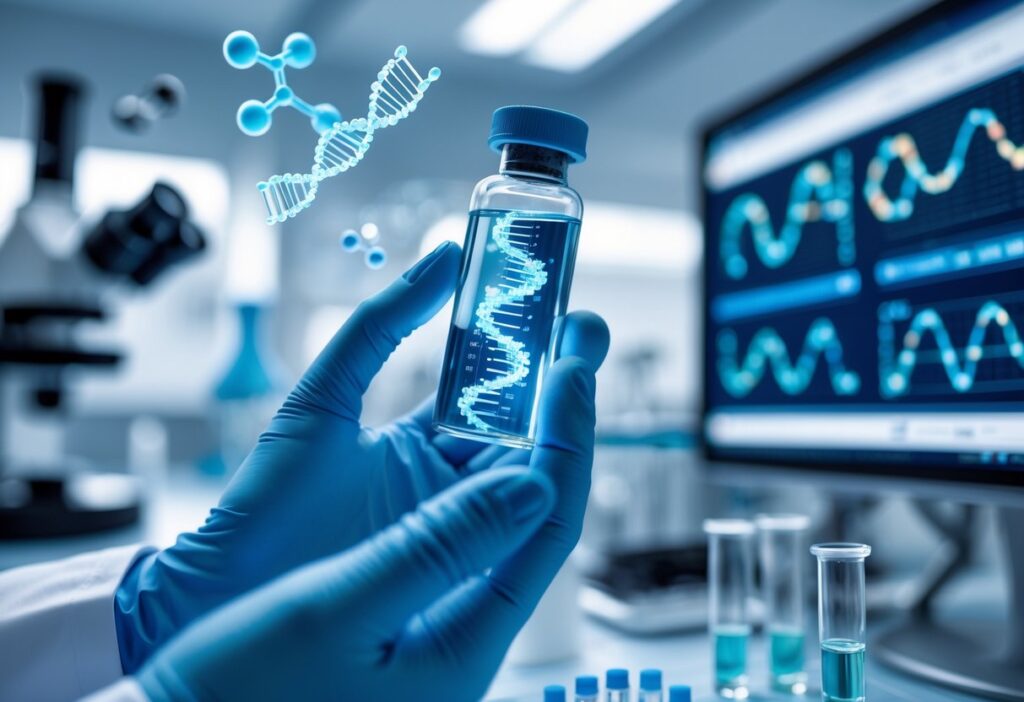Growth Hormone Peptides: A Game Changer for Muscle Performance and Recovery

Many of us are looking for new ways to improve muscle growth and recovery. Growth hormone peptides are gaining attention because they may help our bodies build muscle and recover faster. These peptides work by telling our bodies to produce more natural growth hormone. This process can help with muscle repair, fat loss, and even […]
Potential Benefits of Supplementing with Growth Hormone Peptides for Enhanced Wellness

Growth hormone peptides have become more popular in health and wellness circles. These supplements are often used by people who want to improve muscle growth, speed up recovery, or support healthy aging. Many of us are interested in whether supplementing with growth hormone peptides could actually lead to better exercise results and improved well-being. There […]
The Science Behind Growth Hormone Peptide Therapies: How They Support Health and Wellness

Growth hormone peptide therapies have become more popular in medicine and fitness communities. These treatments use small chains of amino acids, called peptides, to help our bodies increase their natural growth hormone levels. This science-backed approach is designed to support muscle growth, fat loss, and better recovery by using our body’s own systems. Understanding how […]
Understanding the Role of Growth Hormone Peptides in Aging Well: Key Insights and Benefits

As we get older, many of us want to stay healthy and feel our best. One area that has gained attention is the use of growth hormone peptides for aging well. Growth hormone peptides may help our bodies repair and recover, supporting strength, energy, and better quality of life as we age. A lot of […]
The Role of Peptide Therapy in Improving Sleep Quality: Exploring Benefits and Mechanisms

Many of us struggle to get enough good sleep. We try different methods, but sometimes nothing seems to work. Peptide therapy offers a new way to help improve sleep quality for those who need better rest. With this therapy, we use small proteins called peptides to support our natural sleep cycles. Some peptides may help […]
The Science Behind Peptide Therapy and Age-Related Decline: Mechanisms and Clinical Insights

As we get older, our bodies start to change in ways we can feel and see. Many of these changes are linked to lower levels of certain proteins and hormones that help us stay strong and healthy. Peptide therapy is a treatment that uses tiny proteins to support some of the body’s natural functions, which […]
Benefits of Peptide Therapy for Reducing Wrinkles: How It Supports Smoother, Younger-Looking Skin

Peptide therapy is gaining attention as a new way to help reduce wrinkles. Peptides are small proteins that can support our skin’s natural repair process and help keep it looking smooth and firm. As we age, our skin loses some of its strength and elasticity, which can lead to fine lines. Many of us are […]
Unlocking the Anti-Aging Potential of Growth Hormone Peptides: Benefits, Mechanisms, and Research Insights

As we get older, many of us look for ways to keep our bodies and minds feeling youthful. There is growing interest in growth hormone peptides as a way to tap into the body’s natural ability to repair and renew itself. Growth hormone peptides may help support healthy skin, better sleep, and improved energy by […]
Peptide Therapy for Youthful Appearance and Vitality: Unlocking Modern Anti-Aging Solutions

Peptide therapy is becoming a popular option for those wanting to look and feel younger. These tiny proteins can support our body’s natural processes, helping with smoother skin, more energy, and better overall wellness. Peptides may help us achieve a youthful appearance and boost vitality in a safe and straightforward way. Many people are interested […]
The Impact of Collagen Peptides on Aging Skin: Benefits and Scientific Evidence

As we get older, our skin naturally changes. Fine lines and wrinkles may start to show, and skin can lose some of its firmness. Collagen peptides may help improve the look and feel of aging skin by supporting its structure and elasticity. Many people take collagen supplements with the hope of seeing smoother, more youthful […]